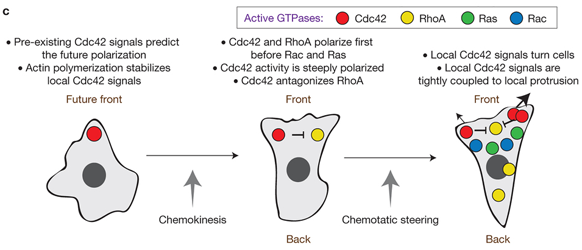Hee Won and Seans’s paper is out in Nature Cell Biology
February 21, 2016

Locally excitable Cdc42 signals steer cells during chemotaxis.
Neutrophils and other amoeboid cells chemotax by steering their front ends towards chemoattractant. Although Ras, Rac, Cdc42 and RhoA small GTPases all regulate chemotaxis, it has been unclear how they spatiotemporally control polarization and steering. Using fluorescence biosensors in neutrophil-like PLB-985 cells and photorelease of chemoattractant, we show that local Cdc42 signals, but not those of Rac, RhoA or Ras, precede cell turning during chemotaxis. Furthermore, pre-existing local Cdc42 signals in morphologically unpolarized cells predict the future direction of movement on uniform stimulation. Moreover, inhibition of actin polymerization uncovers recurring local Cdc42 activity pulses, suggesting that Cdc42 has the excitable characteristic of the compass activity proposed in models of chemotaxis. Globally, Cdc42 antagonizes RhoA, and maintains a steep spatial activity gradient during migration, whereas Ras and Rac form shallow gradients. Thus, chemotactic steering and de novo polarization are both directed by locally excitable Cdc42 signals.
